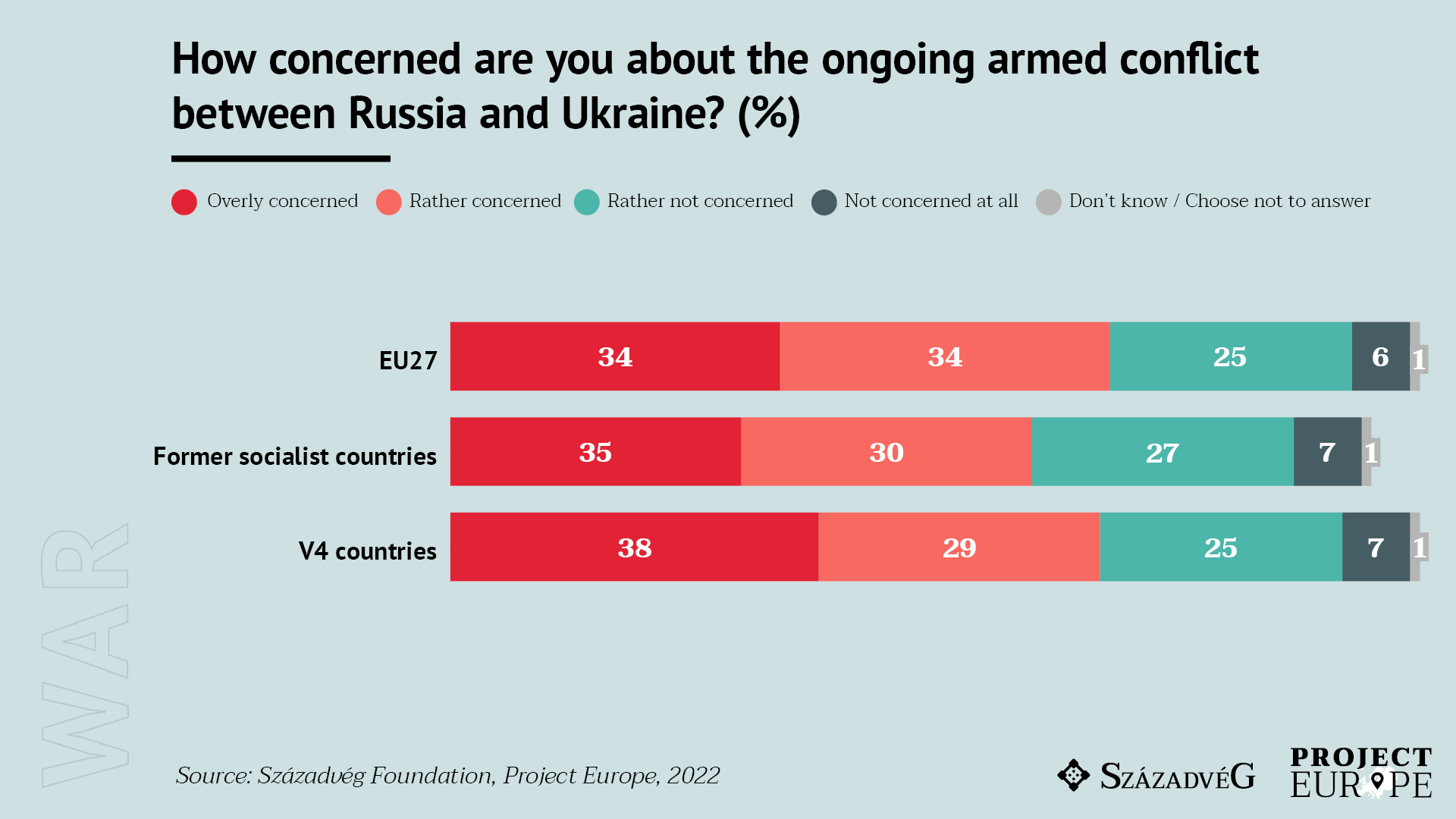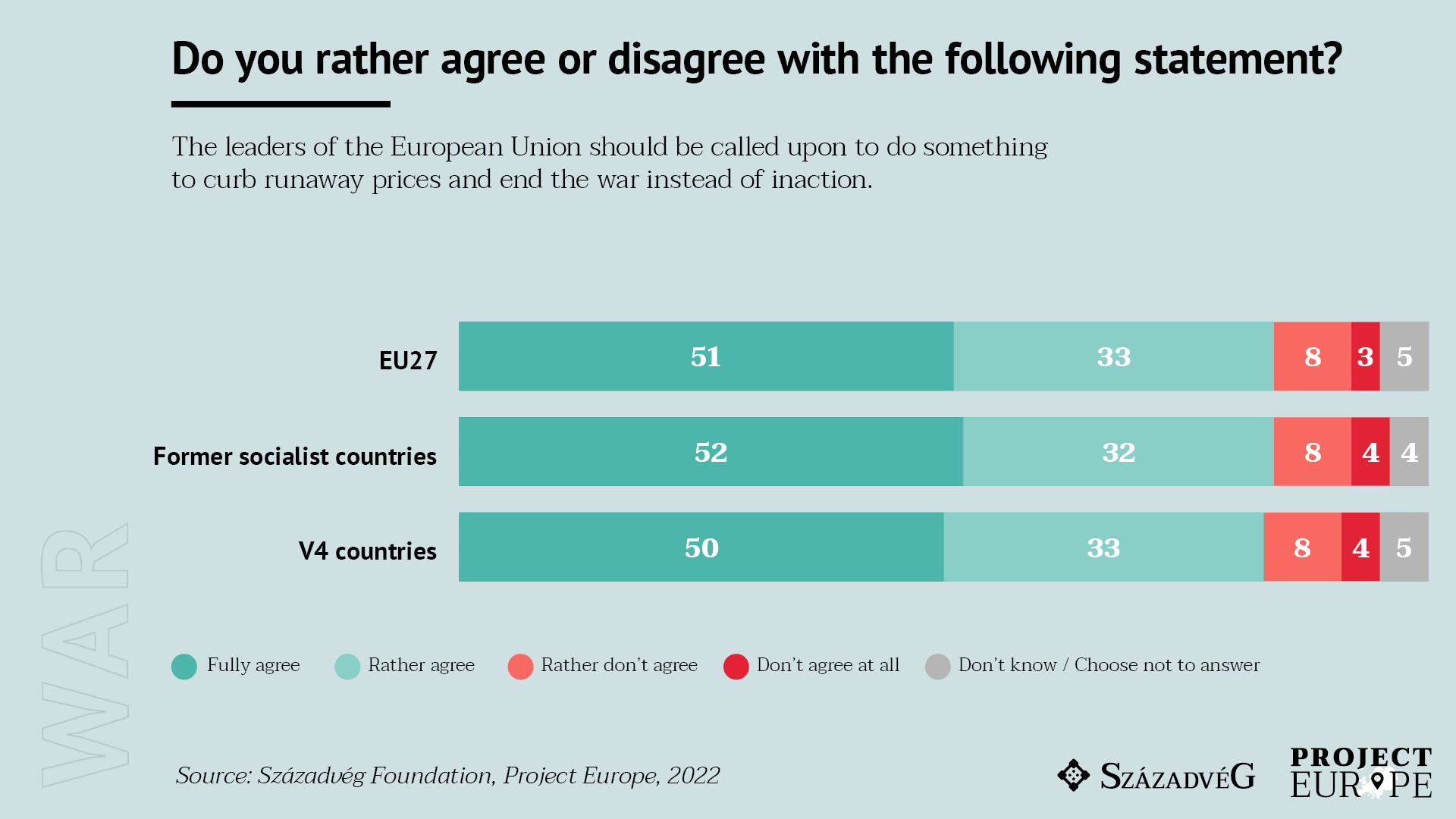Concern for war is felt across Europe
In the light of the research data – and in line with the analysis of Századvég in December – it can be stated that
68 percent of EU citizens, 65 percent of respondents in the former socialist countries and 67 percent of respondents in the V4 countries consider the Russian-Ukrainian armed conflict to be worrying.
Hungarians (93 percent), Germans (81 percent), and Portuguese (78 percent) are the most concerned about the war, while the population of Bosnia and Herzegovina and Slovenia (48-48 percent) is the least concerned.
The lack of meaningful dialogue between Russia and Ukraine, as well as the intensification of military actions, have also led to public concern in European public opinion about the escalation of the armed conflict. The survey shows that
62 percent of EU respondents and 63-63 percent of citizens of the former socialist bloc and the Visegrád Cooperation are concerned about the possibility of the Russian-Ukrainian crisis escalating into a larger war or their own country becoming affected.
Looking at the question by country, it can be concluded that Lithuania and Moldova (80-80 percent) and Hungary (76 percent) have the highest proportion of those who are worried about the risk of escalating the war, while Slovakia (48 percent) and Slovenia (46 percent) are the least afraid of this.
Brussels should promote an end to the war
The consequences of the Russian-Ukrainian war and the sanctions policy of Brussels have also posed serious challenges to the governments of individual European countries. It can be said that European citizens are divided in their assessment of the crisis management performance of their own government.
Forty-six percent of EU respondents are satisfied with the way their own country’s government has handled the situation caused by the armed conflict, but the same number (46 percent) have expressed dissatisfaction with it. Satisfaction significantly above the EU average can be observed in countries such as Great Britain (67 percent), Latvia (64 percent) and Hungary (57 percent),
while Bulgaria (35 percent) and Bosnia and Herzegovina (26 percent) have the lowest proportion of those who speak positively about their own government’s defence-related crisis management performance. At the same time, there is a broad consensus in Europe on the expectations placed on the leaders in Brussels. According to the survey,
84-84 percent of the citizens in the European Union and the former socialist countries, as well as 83 percent of the respondents in the Visegrád countries, agree with the statement that Brussels should finally be called upon to do something to curb runaway prices and end the war instead of inaction.
We must emphasise that in all the European countries examined, the proportion of those who expect action from the leaders of the European Union on this issue has exceeded 60 percent.
In Hungary, 78 percent of those surveyed believe that Brussels should take action to curb inflation due to sanctions and promote peace.
The strong pro-peace stance of Europeans is shown by the fact that more than three quarters (76 percent) of EU respondents believe that Russia and Ukraine should be forced to negotiate peace in order to end the war as soon as possible. Interestingly, in each of the 38 European countries examined, there was a majority of those who considered it essential to bring the parties to the armed conflict to the negotiating table.
According to 87 percent of Hungarians, Russia and Ukraine should be forced to negotiate in order to seek peace.
In the first half of 2016, the Századvég Foundation conducted a public opinion poll survey covering all 28 European Union Member States, with the aim to analyse the opinions of EU citizens regarding the issues that most affect the future of the EU. In a unique way, Project 28 conducted the widest possible survey of 1,000, that is a total of 28,000 randomly selected adults in each country. Gaining an understanding of society’s sense of prosperity and mapping the population’s attitudes towards the performance of the European Union, the migration crisis and the increasing terrorism were among the most important goals of the analysis. Following the surveys in 2017, 2018 and 2019, on behalf of the government, the Századvég Foundation has been conducting the research under the name of Project Europe since 2020, which continued to reflect on the topics that most dominated the European political and social discourse.
In 2022, the aim of the survey is again to map the population’s attitude towards the most important public issues affecting our continent. In addition to society’s sense of prosperity, the performance of the European Union, the coronavirus pandemic, climate change, and the perception of the migration crisis, in line with the latest challenges affecting Europe, the dominant theme of this year’s poll has been the Russian-Ukrainian war, the energy crisis, energy supply, and family policy. In addition to the European Union Member States, the 2022 research covered the United Kingdom, Norway, Switzerland, Moldova, Albania, Kosovo, North Macedonia, Montenegro, Serbia, Turkey, and Bosnia and Herzegovina, and surveyed a total of 38,000 randomly selected adults using the CATI method between 13 October and 7 December.


